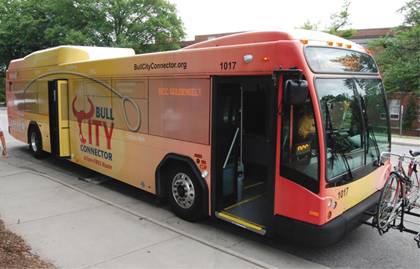Connecting The Bull City
Fare-free Bull City Connector bus marks one year in service

Usually once a week, Kevin Davis walks a couple blocks from his downtown Durham home to the corner of West Main and Gregson streets, where he catches a short, free ride to his office at the American Tobacco Campus.
As one of the hundreds of passengers who hops a hybrid Bull City Connector each day, Davis likes to get a start on work or catch up on reading while someone else drives.
Read More"I've never been a fan of being stuck behind the wheel," said Davis, assistant director of service management and operational integration in the Office of Information Technology. "With a couple thousand Duke employees now downtown, having the Bull City Connector really makes it more feasible to be car-free at Duke."
Since its launch on Aug. 16, 2010, the Bull City Connector has provided more than 252,000 passenger trips in its first nine months. This spring, the number of daily passenger trips serviced reached averages of about 1,300.
Since its start last August, interest in the Bull City Connector prompted an enhancement of operating hours. The service now begins at 6:22 a.m. from the Golden Belt, which allows commuters to get to the Duke Medical Center before 7 a.m.
Phail Wynn, Jr., vice president of Durham and Regional Affairs at Duke, said the fare-free bus service is a benefit for Durham and the entire Duke community. He said the service has been a "successful and tangible representation of the partnership between Duke and our hometown."
"We're happy to see how many Duke students and employees have discovered the Bull City Connector as a cost-effective, environmentally friendly and convenient way to commute and travel between campus and downtown Durham for entertainment and business," Wynn said. "I look forward to seeing more and more employees make that discovery as we continue to offer and improve the service."
Under an agreement with the city of Durham, Duke provided $375,000 in matching funds so Durham could receive a $3 million federal grant and $375,000 state grant to buy new hybrid diesel-electric buses, which will debut on the route in 2012. In the meantime, the City is using four existing 2010 model hybrid buses. Duke also contributes toward the annual operating costs, while the city and Triangle Transit manage the service.
Erin Gasch, director of alumni relations for the Fuqua School of Business, rides the Bull City Connector each month. She first started riding because it was fun for her son, Winston, and daughter, Tate. Now, they all occasionally hop on the bus near their home in the Cleveland-Holloway neighborhood to run errands on Ninth Street or to attend Duke football and basketball games on West Campus.
"I appreciate the investment Duke has made in supporting the Bull City Connector because it's another contribution to Durham that is valuable to me as a resident and a Duke employee," Gasch said. "It does a great job at bringing the university closer to downtown, which helps to build a stronger community."